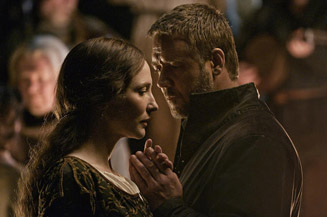|
|
What Went Wrong: Robin HoodBy Brian PewJune 14, 2010
By all indications, it was not their original intent to open up their war chests to finance the production. Robin Hood had a topsy-turvy pre-production that set it back a few years (and a few million). It started out as a project telling the Sheriff of Nottingham’s story, in which the classic villain was actually a good guy. When director Ridley Scott climbed aboard, he nixed the original script and brought in hired hands to do some reworking, causing unexpected delays. Other setbacks came from several casting changes. Crowe was originally on-board as BOTH the Sheriff and Robin Hood, but Universal stepped in and (thankfully) remedied that poor decision. Maid Marion was also recast from Sienna Miller to Cate Blanchett when it was realized that the gorgeous Ms. Miller made her leading man look like he was in his mid-40s. Nevermind that he is, the studio did not want to highlight an obvious issue. All of these and more delays added up, as the negative costs reached $65 million even before set production began. The whole production process of Robin Hood dismayed Universal to the point that the studio is on record for steering clear of adult drama and action in favor of comedies, family films, and other cheaper genres. Any time a single movie alters the entire production philosophy of a studio, you can wager that something either amazing or terrible happened. Unfortunately for Universal, Robin Hood falls under the “terrible” column. Perhaps not as overt as going WAY over budget, the nature of the origin premise seems to be a natural put-off to filmgoers. This version of Robin Hood is not the classic tale, but rather a foundation story of how Robin Hood came to be. As of late, “origin” tales have equaled box office disappointment. Think of how Batman Begins paled in comparison to The Dark Knight, or how you haven’t seen any more X-Men Origin flicks since Wolverine was a one weekend wonder. Why does this happen? This is a point of contention that has been batted around by the BOP staff before. One theory is that movies spend too much time setting up the story instead of showing the action. In other words, for this Robin Hood there was not enough of “robbing the rich to give to the poor.” Lastly, something must be done about this Russell Crowe/Ridley Scott combo platter. Sure, we enjoyed Gladiator, and American Gangster had its moments. But after this fifth serving of the bromance, the couple is only batting two-out-of-a-five. Let us not forget the duds A Good Year and Body of Lies. Some pairings - I’m thinking about Tim Burton and Johnny Depp here - literally bring the best out of each other. The Scott/Crowe duo seems to bring out nothing other than familiarity. And based reviews for Robin Hood, that assessment seems legitimate. Many of the critics pointed out how the film is made up of solid acting, set pieces, etc., but when put together something was missing. For all of the changes in preproduction, all of the money spent, and how well the two know each other, the fact that Robin Hood goes down as a miss must be squarely on their shoulders. Let’s just hope that the rumors that Ridley is up for The Hobbit now that Del Toro is passing are vicious, hateful, unsubstantiated lies, lest we get a sixth serving of Scott/Crowe with Russell as Bilbo (*shudder*).
|

|
|
|

|
Friday, November 1, 2024
© 2024 Box Office Prophets, a division of One Of Us, Inc.


